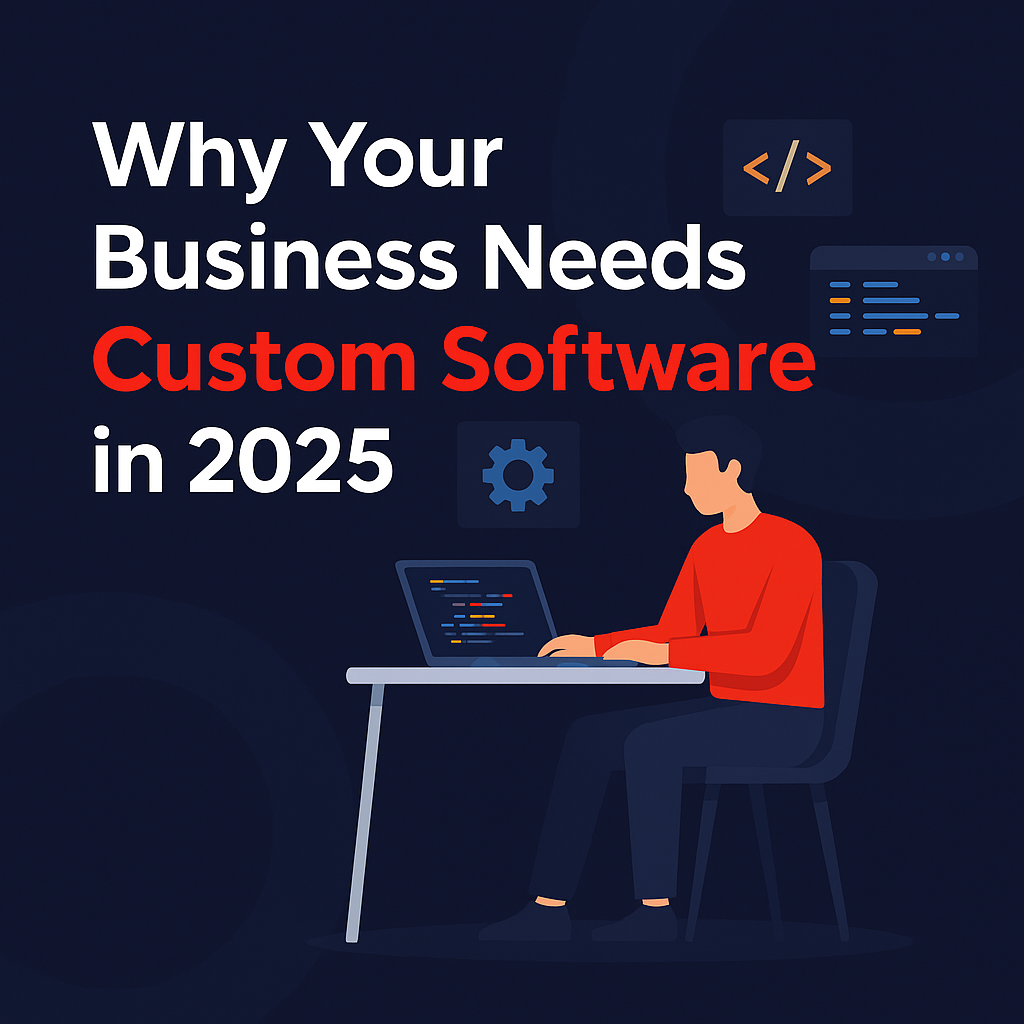Why Your Business Needs Custom Software in 2025 In today’s digital-first world, businesses are rapidly moving towards automation and customization to meet their unique needs. As we step into 2025, the importance of custom software has become more critical than ever before. Off-the-shelf solutions may provide temporary relief, but they often fall short in long-term scalability and efficiency. Let’s explore why custom software is not just a choice, but a necessity for businesses in 2025. 1. 💼 Tailored to Your Business Needs Every business has unique workflows, challenges, and goals. Pre-built software solutions are designed for the masses and rarely align with your specific operational structure. Custom software, on the other hand, is developed specifically for your business. It aligns perfectly with your processes, resulting in improved efficiency, reduced redundancies, and streamlined operations. 2. 🚀 Scalable and Future-Ready In 2025, adaptability is key to survival. Custom software grows with your business. Whether you need to integrate new features, expand user access, or handle higher volumes of data, your software can scale accordingly without breaking the system or requiring a total overhaul. This saves time, cost, and effort in the long run. 3. 🔐 Enhanced Security and Data Protection Cybersecurity is one of the biggest concerns in today’s digital age. Generic software is more vulnerable to attacks because hackers already know how to exploit its common structures. Custom software offers better security because it is built with your unique needs in mind and often includes extra layers of protection. You can control the access, encrypt the data, and integrate it with secure third-party tools that align with your compliance requirements. 4. 🔄 Seamless Integration with Existing Systems Many businesses rely on multiple tools and platforms to manage their operations. Custom software can be designed to integrate perfectly with your existing ecosystem—whether it’s your CRM, ERP, or marketing tools. This ensures smooth data flow, reduces manual work, and improves overall productivity. 5. 👥 Improved Customer Experience In 2025, customer expectations are higher than ever. People expect fast, reliable, and personalized services. With custom software, you can develop features that directly address your customer’s pain points—whether it’s a simplified checkout process, a chatbot for instant support, or an analytics dashboard that provides real-time insights. 6. 💰 Cost-Effective in the Long Term While the upfront cost of custom software might seem high compared to ready-made solutions, the long-term ROI is much higher. You save money on monthly licensing, avoid paying for unnecessary features, and reduce costs related to inefficiency and downtime. It’s a long-term investment that pays off over time. 7. 🧩 Competitive Advantage Having your own custom software gives your business a unique identity. It reflects your brand’s professionalism and innovation. It also sets you apart from competitors still using generic tools. With tailored reports, intelligent dashboards, and automation, your business can make smarter decisions faster. 🌟 Conclusion 2025 is the year where innovation will define winners and losers in the business world. Custom software is no longer a luxury—it’s a strategic necessity. Whether you’re a startup, SME, or enterprise, investing in custom software can streamline operations, enhance customer satisfaction, and position your business for sustained growth.
AI & Emerging Technologies
How AI is Transforming Web and App Development in 2025 In 2025, Artificial Intelligence (AI) continues to revolutionize the landscape of web and mobile application development. From automating backend processes to delivering personalized user experiences, AI is not just a buzzword—it’s a powerful tool shaping the digital world. 1. Smarter Web DesignAI-powered design tools can now analyze user behavior to suggest optimized UI/UX elements. These intelligent systems reduce the time spent on wireframing and prototyping by auto-generating layouts that align with user intent and engagement data. 2. Enhanced Security ProtocolsMachine learning algorithms detect unusual user behavior, helping developers secure applications against data breaches and cyber threats in real-time. 3. Automated Code GenerationModern AI platforms can write code snippets based on user input or design mockups, enabling faster and more accurate development workflows. 4. Voice and Image RecognitionVoice-based search and image processing are now standard features in mobile apps, thanks to advancements in Natural Language Processing (NLP) and Computer Vision. Integrating AI Chatbots into Your Business Website: A Step-by-Step Guide AI chatbots are transforming customer service by providing 24/7 support, increasing engagement, and boosting conversions. Here’s how to integrate one into your website: Step 1: Define Your Chatbot’s RoleDetermine whether your bot will answer FAQs, assist with sales, or provide technical support. Step 2: Choose the Right PlatformPopular chatbot platforms include Dialogflow, Microsoft Bot Framework, and Tidio. Select one that suits your technical needs and budget. Step 3: Design User FlowsCreate conversational scripts and flows based on common customer queries to improve interaction quality. Step 4: Integrate with Your WebsiteUse the chatbot platform’s code snippet or plugin to embed the bot into your website, especially on high-traffic pages like home, product, or contact. Step 5: Train and MonitorContinuously train the bot using new data and monitor its performance through analytics dashboards to refine its capabilities. The Role of Machine Learning in Enhancing User Experience Machine Learning (ML) personalizes digital experiences by analyzing user data and predicting behaviors. Here’s how ML enhances UX: 1. Personalized ContentML algorithms recommend content, products, or services based on individual user preferences and browsing history. 2. Dynamic InterfacesApplications adapt their interface based on user behavior, showing relevant features or content to each unique visitor. 3. Predictive SearchML enhances search functionality by predicting queries and displaying relevant results before the user finishes typing. 4. Behavior-Based AlertsApps can send intelligent notifications or alerts based on real-time user actions, increasing engagement without being intrusive. Conclusion:As AI and ML technologies continue to evolve, their integration into web and app development becomes not only beneficial but essential. Businesses that adopt these innovations early position themselves for enhanced efficiency, superior user experience, and long-term success.
.NET Development & Software Architecture
. NET Development & Software Architecture Why ASP.NET Core is Ideal for Scalable Enterprise Applications In today’s highly competitive and digitally driven world, businesses are increasingly dependent on technology to drive growth, improve efficiency, and deliver seamless user experiences. As companies scale, their need for robust, secure, and highly performant web applications becomes paramount. Choosing the right technology stack is no longer just a technical decision — it’s a strategic one that directly impacts long-term success. Among the many web development frameworks available today, ASP.NET Core, Microsoft’s modern, open-source, and cross-platform framework, stands out as a top contender for building enterprise-level solutions. With its cutting-edge architecture, superior performance benchmarks, and vast ecosystem, ASP.NET Core empowers developers to create dynamic, scalable, and maintainable applications that can grow alongside business needs. Whether you’re building a multi-tenant SaaS product, enterprise portal, or an API-driven backend system, ASP.NET Core provides the tools and flexibility needed to deliver mission-critical applications efficiently — all while ensuring security, speed, and scalability. 1. Cross-Platform Development ASP.NET Core supports cross-platform development, allowing applications to run seamlessly on Windows, macOS, and Linux. This flexibility enables enterprises to deploy applications across diverse environments without compatibility issues. 2. High Performance and Scalability With its modular architecture and lightweight runtime, ASP.NET Core delivers exceptional performance. Features like asynchronous programming, optimized memory usage, and built-in caching mechanisms ensure that applications can handle high traffic loads efficiently. 3. Built-In Dependency Injection ASP.NET Core comes with built-in dependency injection (DI), promoting loose coupling and enhancing testability. This feature simplifies the management of application components and supports the development of maintainable codebases. 4. Robust Security Features Security is paramount in enterprise applications. ASP.NET Core offers comprehensive security features, including authentication, authorization, data protection, and HTTPS enforcement. These tools help safeguard applications against common threats. 5. Seamless Integration with Modern Front-End Frameworks ASP.NET Core integrates smoothly with popular front-end frameworks like Angular, React, and Vue.js. This compatibility allows developers to build dynamic, responsive, and user-friendly interfaces that enhance user experience. 6. Cloud-Ready Architecture Designed with cloud deployment in mind, ASP.NET Core supports containerization with Docker and orchestration with Kubernetes. Its compatibility with cloud platforms like Microsoft Azure facilitates scalable and resilient application deployments. 7. Active Community and Support Being open-source, ASP.NET Core benefits from a vibrant community of developers and contributors. This active ecosystem ensures continuous improvements, regular updates, and a wealth of resources for troubleshooting and learning.




